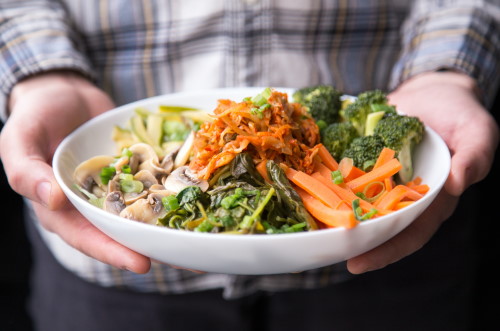People with overweight might want to consider going vegan for reasons that have nothing to do with shedding excess pounds. A new study suggests that adopting a plant-based diet can help save hundreds of dollars each year on groceries.
For the study, 244 adults with overweight were randomly assigned to switch to a vegan diet or continue their usual eating habits for 16 weeks. A vegan diet is a type of vegetarian diet that excludes all forms of meat, eggs, dairy, and other animal products, such as honey or gelatin.
BREAKING: Shed 42 lbs In 30 Days With This Simple Night-time Pill
Researchers didn’t place any restrictions on how much food people could eat, or set any limits on their grocery budget. At the start of the study, and again at the end, participants recorded detailed food diaries over two weekdays and one weekend day to provide a snapshot of what they ate and what it cost.
When people switched to a vegan diet, they spent about 16 percent less on food, according to study results published in JAMA Network Open. Participants who stuck with their usual diets, meanwhile, didn’t see any meaningful changes in their grocery bills.
“Buying fruits, vegetables, grains, and beans, and avoiding purchasing animal products, produces the most savings,” says lead study author Hana Kahleova, MD, PhD, director of clinical research at the Physicians Committee for Responsible Medicine. “Beans and grains are some of the most budget-friendly foods.”
Going Vegan Is Cheaper, Even When Spending More on Fruits and Vegetables
Switching to a vegan diet did increase spending on some foods, the study found. For example, average daily spending climbed from 95 cents to $1.42 for fruits, and from $2.03 to $3.00 for vegetables.
But the extra spending on foods that are staples in a vegan diet wasn’t as much as the savings from eliminating animal products, the study also found. For people who switched to a vegan diet, average daily spending on meat dropped from $1.79 to $0.03, and from 88 cents to 5 cents for dairy products.
One limitation of the study is that researchers relied on participants to accurately recall and report on their eating habits. Another drawback is that it excluded spending on alcohol.
Savings From Vegan Diet Add Up Over the Year
Still, the results suggest that an individual could save more than $10 a week on a vegan diet, adding up to more than $500 a year, Dr. Kahleova says. The savings are even more pronounced, in excess of $2,000 a year, for a family of four, Kahleova adds.
Part of the savings may also occur because people who switch to meat and dairy alternatives don’t spend as much on these products as they would spend on real meat and milk, says Michal Melamed, MD, a professor of medicine, pediatrics, and epidemiology and population health at Albert Einstein College of Medicine and Montefiore Medical Center in the Bronx, New York.
The biggest savings, however, would likely come from preparing whole foods from scratch, adds Dr. Melamed, who wasn’t involved in the new study. “I think the key to saving money on a vegan diet is to buy fresh ingredients and then cook at home,” Melamed says.
You Don’t Have to Go Completely Vegan to Reap the Health and Cost Benefits
When people aren’t ready to go completely vegan, they may still be able to achieve some savings and health benefits from a part-time plant-based diet that focuses on reducing meat portions, says J. David Spence, MD, director of the stroke prevention and atherosclerosis research center at Robarts Research Institute in London, Ontario, Canada.
“I ask my patients to reduce their intake of animal flesh — any kind of animal, not just beef — to a serving the size of the palm of their hand every other day, so they go meatless every other day,” says Dr. Spence, who wasn’t involved in the new study.
If that still feels like too big a change, start with meatless Mondays, says Samantha Heller, RD, a senior clinical nutritionist at New York University Health in New York City. Plant-based dishes that are similar to comfort foods containing meat may make the switch easier, too, says Heller, who wasn’t involved in the new study.
TRENDING: 1 Cup of This Melts Belly and Arm Fat (Take Before Bed)
Simple swaps can help, too, Kahleova says. “Instead of pasta Bolognese, opt for pasta with meatless marinara sauce. Instead of a beef or chicken burrito, opt for a bean burrito. And instead of a hamburger, opt for a black bean burger or grilled portobello burger,” Kahleova suggests. “There are so many vegan recipes out there that you can find a replacement for any animal product.”









